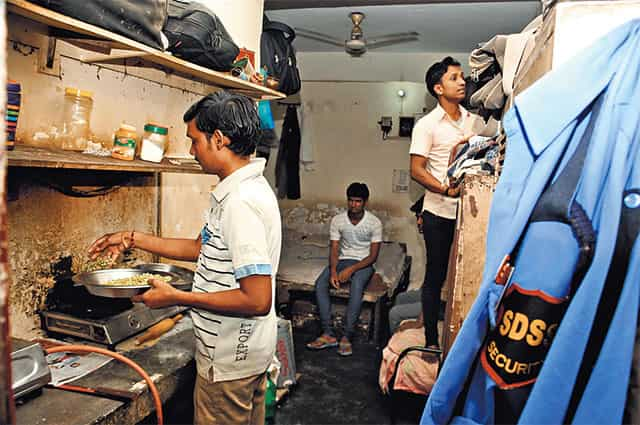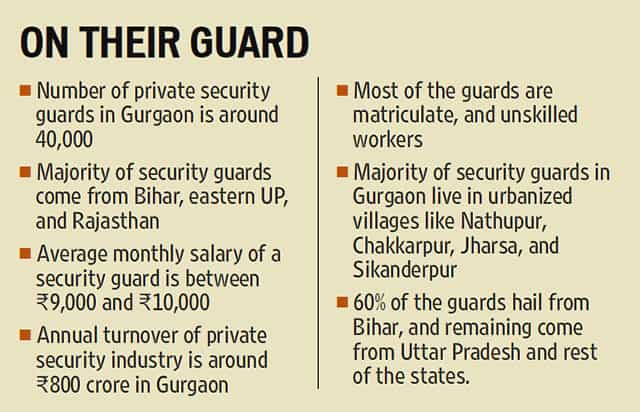They stay awake to ensure Gurgaon sleeps
Security guards in the city face problems like 12-hour shifts, few employee benefits and low salaries.
He's surrounded by urban glitz but Raj Kumar says it's pointless when there's no time to check out any of the attractions. "I've been working here for seven years but haven't had a day to spare for the city's beautiful malls and popular hotspots," says Kumar, one among nearly 40,000 private security guards working in Gurgaon.

Rapid commercial development in and around the financial hub has created unprecedented demand for security services that can only be catered to by private players.
The sector is naturally labour-intensive and the men and women who form its backbone are drawn largely from Bihar, Uttar Pradesh and Rajasthan. Behind their smart appearances are stories of low pay, few employee benefits and 12-hour shifts of drudgery.

Provident fund contributions exist mostly in theory. (Parveen Kumar/HT Photo)
A 12-hour shift can become a 24-hour one at a moment's notice, provident fund contributions exist mostly in theory, leave is always without pay and job security unheard of.
"Job security is not something the employees themselves appear to be interested in. The attrition rate is so high that 75% workers leave the sector every year. But the constant churn allows new people to come in from the villages in search of greener pastures," says Surender Singh, who runs a security agency.
The bigger the employer, the lesser the concern for human resources, says Singh, adding that the commercial complexes and gated housing communities which hire guards treat them as dispensable, unskilled labour. "I pay salaries on time and keep up with the ESI and PF payments, but for companies these guys are easily substitutable labour, so they don't care too much about security workers' interests," he says.
Ravi Kumar, a guard, recalls how a company fired him for failing to turn up at work because he was ill. "Everything is paid for by us. The dress, the cap, everything is accounted for. Even if the whistle is lost, the company charges Rs 25 to replace it. With average salaries not exceeding Rs 9,000-10,000 a month and the bulk of the money sent home, these amounts aren't insignificant for us ," he says.

Ironically, in commercial Gurgaon where companies participate in surveys to earn titles such as 'best company to work for' and throw all kinds of incentives to draw whitecollar talent, the security guards enjoy no corporate protection.
They are forced to rely on informal financing and recruitment networks. Everyone comes through a relative or neighbour and even money is remitted home through trusted travellers.
"Once we arrive here, things are hardly rosy. I live in a room with eight other people," says Rajesh Yadav, from Supaul in Bihar, a state estimated to contribute almost 60% of the sector's manpower.
"We sleep during the day and work in the night shift, when another group of eight comes and sleeps in the room," he says. It doesn't help that landlords in Gurgaon aren't known to be soft on tenants delaying rent payments.

For these security guards, a 12-hour shift can become a 24-hour schedule at a moment’s notice. (Parveen Kumar/HT Photo)
Yadav says the introduction of MNREGA, the rural job guarantee scheme, has somewhat reduced the number of people migrating to cities, but the impact is not significant.
"To sustain a family, you need more than just the 100 days of minimum-wage employment guaranteed by the government," he says.
Purshuttam Kumar, a veteran guard, says each other's support is all they can bank on. So, money-pooling committees are formed and the kitty is used to meet the members' individual needs. "Say, if there's a wedding in someone's family, the money pooled in by the committee is utilised for it," he says.
Despite the tough working conditions, the workers try to keep pace with new avenues of entertainment. Many are active on WhatsApp groups and share Bollywood videos.
"I like the shows on Colors channel and watch clips on YouTube sometimes," says Usha, a female security guard. Her colleague Sanjay says he incurs phone expenses of Rs 50 a day to stay in touch with his fiancee.
"People may perceive and treat us like human robots but we're like anybody else here, just trying to make the most of our lives," Raj Kumar sums it up philosophically.
Stay updated with all the Breaking News and Latest News from Mumbai. Click here for comprehensive coverage of top Cities including Bengaluru, Delhi, Hyderabad, and more across India along with Stay informed on the latest happenings in World News.
Stay updated with all the Breaking News and Latest News from Mumbai. Click here for comprehensive coverage of top Cities including Bengaluru, Delhi, Hyderabad, and more across India along with Stay informed on the latest happenings in World News.





